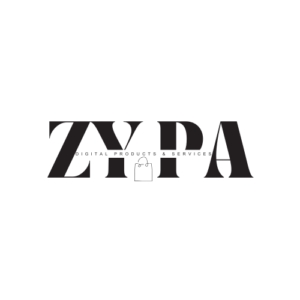Filter bubbles, partisan editing wars, and a deluge of context-free snippets were what we got instead of the democratized knowledge that the digital era promised. Wikipedia, a giant of crowdsourced knowledge, is in the midst of all of this turbulence and is frequently accused of having ingrained editorial bias. However, what would happen if the most disruptive company in the world decided that human knowledge was “hopelessly biased” and that it needed to be completely rebuilt using artificial intelligence? Elon Musk suggests Grokipedia as a solution.
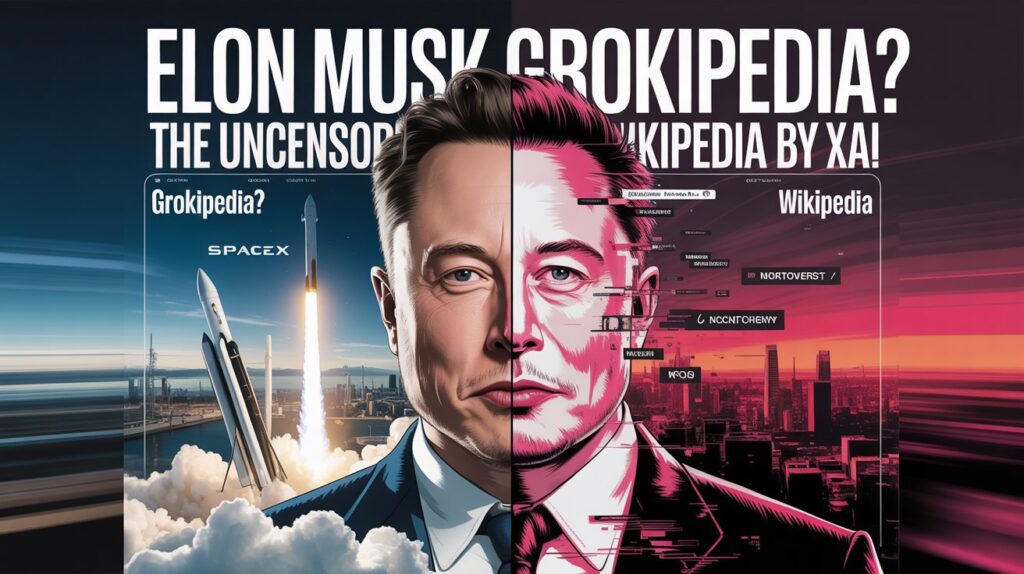
Instant Context: Currently being developed by xAI, Grokipedia is more than simply a Grok AI feature; it is a specialized, open-source knowledge base and a direct, AI-powered competitor to Wikipedia. Its main objective is to circumvent ideological restriction and human editorial bias by creating an unfiltered knowledge base based on basic principles, physics-based truth, and transparent, verifiable facts. It is powered by the Grok Large Language Model (LLM), a philosophy and reasoning engine
The Fundamental Discovery → The True Nature of Grokipedia
The source of truth—the cornerstone on which we construct our own expertise—is crucial for anyone immersed in the realm of digital growth and content creation. The digital world has been rocked by the introduction of Grokipedia, which begs the crucial question: is this a true revolution in knowledge or just another gimmick feature drop?
What is Grokipedia → Project, Rival, or Feature?
One competitor is Grokipedia. Within the xAI framework, it is a unique, strategic project that is specifically intended to displace Wikipedia as the most extensive and trustworthy knowledge source in the world—not only for people, but also, and this is essential, for AI systems.
“We are building Grokipedia @xAI. Will be a massive improvement over Wikipedia. Frankly, it is a necessary step towards the xAI goal of understanding the Universe.” Elon Musk himself verified the ambition on X.
This directly connects Grokipedia to xAI’s ultimate, bold objective: comprehending the actual nature of the universe. You cannot afford to train your state-of-the-art AI models, such as Grok 3 or future AGI systems, on what you perceive to be faulty, ideologically tainted, or insufficient data if your objective is to comprehend the cosmos.
The main purpose of Grokipedia is to use the Grok AI chatbot’s reasoning capabilities to absorb all of the world’s knowledge, including Wikipedia, scholarly articles, and other websites, and then methodically apply a strict logic to:
- 🚀 Determine what is completely untrue, what is half true, and what is true.
- 📌 Verify by comparing data using “first principles” reasoning, which breaks down complicated issues into their most basic, essential truths.
- 🎯 Reconstruct: Revisit the knowledge base, removing partial truths, biases, and missing context.
Those who value AI tools for high-level research and business are already buzzing about the early access. It is anticipated that the “Version 0.1 early beta” would be an open-source knowledge base that will be made available to X Premium members first, extending xAI’s capabilities beyond conversational AI to structured data.
Micro-CTA: Are you depending on verified first principles or “consensus” knowledge? How soon are you going to switch to an AI-verified repository if your content creation software relies on objective facts?
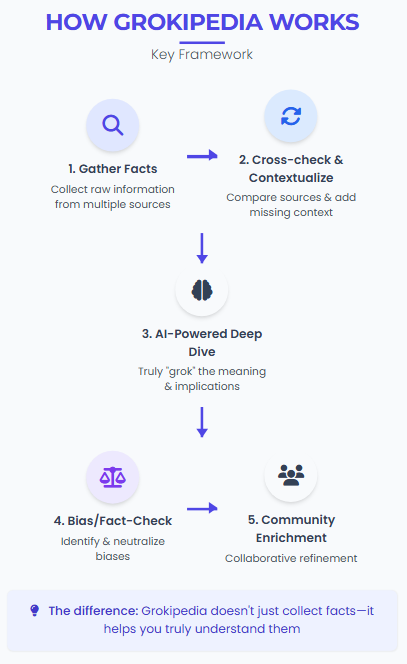
Breaking Down the Drama → Elon Musk’s Declaration of War on Wikipedia
You must first comprehend why Grokipedia exists. Elon Musk doesn’t introduce rival goods until he thinks the market leader has fundamentally failed. In this instance, he believes that internal political pressures have undermined Wikipedia, making it a victim of its own success.
The ‘Wokepedia’ Issue → Grokipedia Uncensored
Elon Musk’s long-standing, frequently divisive claim that Wikipedia has been taken over by activist editors with a liberal slant, resulting in what he refers to as “censorship” of conservative or dissenting opinions, is the driving force behind the grokipedia narrative.
According to Musk, the goal of grokipedia uncensored is to eliminate the ideological filter rather than all filters, such as those that prohibit hate speech or unlawful content. When applied to the actual reality, digital marketing automation tools provide the promise of a system that automatically corrects itself based on logic rather than the political inclinations of a select group of influential human administrators.
As demonstrated by Google’s creator guides, high-achieving bloggers adhere to two principles that reflect this goal: originality and expertise. Musk is staking xAI’s claim on “pure expertise” that is impervious to the human experience that imparts bias by establishing Grokipedia as the supreme authority.
“Wikipedia is hopelessly biased… We are building Grokipedia @xAI. Will be a massive improvement over Wikipedia.”
Elon Musk (September 2025, X Post)
The drama is genuine: Musk once made a lighthearted offer to give the Wikimedia Foundation $1 billion if they rebranded as “Dickipedia,” highlighting his intense annoyance with what he sees as a biased platform. A crucial lesson for all web hosting for creative professionals and content strategists is that this type of “unfiltered tone” and contentious participation is exactly what generates enormous audience engagement.
According to Musk, Wikipedia is “hopelessly biased.” Will Grokipedia merely exchange one set of prejudices for another (Musk’s and AI’s) or is it even conceivable to have a completely impartial knowledge source? Comment your opinion too!
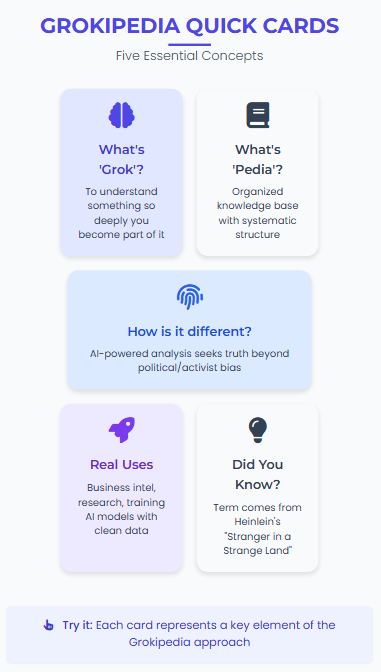
Grokipedia vs Wikipedia → Uncensored Battle
How does grokipedia compare in the huge world of generative AI and online knowledge? It occupies a special place at the nexus of an encyclopedia’s structure and a state-of-the-art LLM’s computing capacity.
Comparing Censorship, Tone, and Facts
The source of authority is the primary distinction. Whereas Grokipedia depends on computational inference and Grok AI’s direct access to real-time data, Wikipedia depends on human editors’ consensus.
| Feature | Wikipedia | Grokipedia: The Uncensored Difference |
|---|---|---|
| Sources of authority | Human editors, community consensus, vetting guidelines | Grok AI (LLM), First Principles Logic. This logic relies on code and physics rather than human political objectives. |
| Tone & Style | Encyclopedic, Neutral Point of View (NPOV) | ‘Unfiltered’, ‘Edgy, Contextual,’ gives the complete truth—often contentious—without editorial softening. |
| Verification Method | Citation/Source Vetting by Human Administrators (Slow, Subjective) | AI Inference Engine (Real-time, Quantitative) AI classifies data as True, Partially True, or False. |
| Updates | Updates are contingent on the availability of volunteer editors (delayed). | Real-time integration (through the X platform/Grok API) guarantees that the repository is always up to date, which is crucial for SaaS comparison in 2025. |
| Censorship/Bias | ideological/political editorial filters | Regardless of political correctness, the bias-minimizing algorithm seeks to present all verifiable facts. |
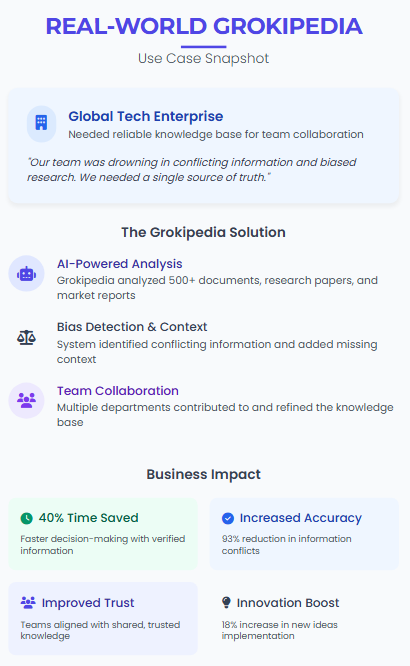
First Principles Over Consensus in the AI Engine
Despite being great research and conversational AI helpers, ChatGPT and Perplexity only offer a fluid response depending on their training data. Rebuilding the fundamental data source itself is not something they guarantee.
Conversational and information-synthesizing, ChatGPT/Claude does not keep an independent knowledge base. Rather of building a globally standardized, verifiable knowledge base, its main purpose is utility.
Perplexity: Serves as an excellent discovery engine by placing a strong emphasis on citation and source aggregation.
Future LLMs (as well as people) should implicitly trust Grokipedia. It is a new paradigm for structured knowledge driven by an LLM educated to challenge presumptions, and it is an underlying infrastructure initiative. Because of this method, it is an essential part of any AI writing assistant’s fact-checking toolkit.
Grokipedia promises distinctive, context-rich content that hasn’t yet been standardized by mainstream editorial consensus, making it a great choice for creators searching for the best tools and software for creators that give them a competitive advantage.
Micro-CTA: Which is more reliable in the search for truth—an AI-driven, logic-based model (Grokipedia) or a human consensus model (Wikipedia)? Which review of productivity software would you give top priority to?
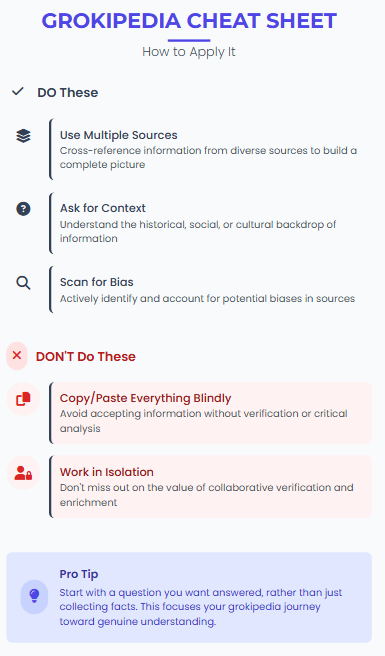
The Unfiltered Edge → How Reality Is Rewritten by Grok AI
The unfettered mechanism—the Grok LLM’s knowledge-creation process—is where the true magic and the underlying dispute are. Here, xAI’s aim goes beyond a straightforward website to become a truth-verification Software as a Service solution.
By using huge inference computation, the Grok AI does more than simply scan a Wikipedia article; it deconstructs it into “first principles.” This entails reducing each statement to its most fundamental, indisputable facts, much like physics or engineering problems are resolved.
The Algorithm for Verification: Falsehood, Half-Truth, and Truth
Musk’s language and xAI fans’ hints point to a three-stage content verification pipeline as the main workflow—a quick route to factual clarity:
- Ingestion & Classification: Grok consumes a vast amount of textual data, ranging from real-time X postings to historical encyclopedias. Each claim in that data set is categorized as follows:
- TRUE: Corroborated by logic, physics, or other independent, non-ideological sources. 🚀
- PARTIALLY TRUE (or Half-Truth): Factually accurate but severely slanted, utilizing loaded language, or lacking important context. 📌
- FALSE: Neither verifiable nor directly at odds with accepted foundational principles. 🎯
- Correction & Contextualization: Grok AI actively rewrites the article, making sure that “False” assertions are either eliminated or marked with prompt, thorough correction, and that lacking context is added to “Partially True” statements.
- The Uncensored Output: The last entry in Grokipedia is a compilation of knowledge written in Grok’s distinctively assertive, occasionally edgy, and always straightforward style—the very core of what Grokipedia is. For corporate AI solutions that require prompt, non-euphemistic responses, this is a potent feature.
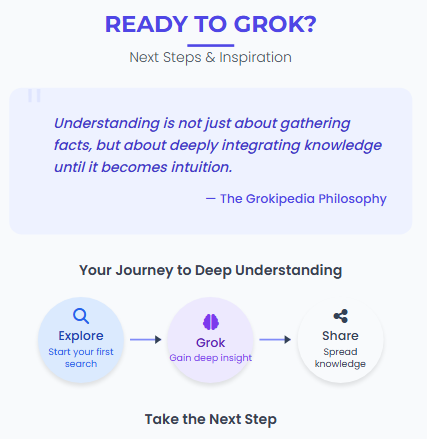
Sample Grokipedia Reusable Prompts
Clarity and context are the main objectives as we wait for the official interface. Grokipedia is better suited to handle the following kinds of deep-dive, high-value prompts than conventional platforms or simple LLMs:
| Category | Reusable Prompt | Expected Outcome: Grokipedia |
|---|---|---|
| Controversial Context | Using only first-principle confirmed facts, describe the mainstream and dissenting perspectives on the 2024 US election misinformation claims. | comparison of stories based on facts, with confirmed lies clearly marked. |
| Historical Revision | Examine figure X’s historical legacy while distinguishing documented, verified activities from popular belief. Give the context that state-sponsored narratives frequently leave out. | Bold, thorough history that contains unpleasant facts. |
| Ask Grokipedia about Elon Musk’s Mars vision | and its likelihood of success, which is based on the thrust of the Raptor engines now and the anticipated failure rates of starships. | Not just a biographical synopsis, but a very technical, physics-based analysis. |
| Real-Time Data | Cite real-time X user data and developer input to summarize how the most recent Grok 4 version has affected the usage of analytics software tools worldwide. | examination of a breaking topic that is rich in context and almost instantaneous. |
Micro-CTA: Do you want to become an expert in providing high-value, contextual information? Develop the practice of asking “Why?” from five different angles. It’s the mindset of high-paying freelancers. Find five of the best articles on a given subject using a basic SEO tool review, then ask Grok or Grokipedia to compare the underlying presumptions.
A Prelude to the Future → The User Experience on Grokipedia (Conjecture)
According to the most recent announcements, the early beta for Version 0.1 will soon be available. Although we lack screenshots of the live Grokipedia interface, we can construct an engaging user experience that emphasizes clarity and interactivity—two essential elements for boosting creator engagement worldwide—based on the xAI vision and developer discussion, including concept designs discovered on websites like GitHub.
Version 0.1 Beta and the Goal of Instantaneous Updates
Features beyond static text are anticipated for the future Grokipedia experience, which will directly include AI capabilities into knowledge consumption:
- Fast Visual Contrasts: Picture a side-by-side perspective. When you search for a contentious issue, the system immediately shows: 🚀
- Wikipedia Article: The Historical Consensus View
- The Contextual, AI-Verified View (Real-Time) of the Grokipedia Entry
- Grokipedia reportedly plans to link with xAI’s Grok Imagine platform, which will turn dense text into an easily comprehensible visual guide by enabling users to request an AI-generated video or visual explanation of a complicated topic. This is revolutionary for 2025’s Best Design Tools. 📌
- The Transparency Layer: Each paragraph in a Grokipedia entry probably has a clickable flag that shows the primary sources used, the reasoning (first principles) used, and the confidence score for that information. This level of transparency is simply unmatched by Wikipedia’s human editorial boards. 🎯
- Interactive Quote Timeline: To keep users interested and browsing, the website might include a timeline slider with statements from Musk that are relevant to the subject or Grokipedia’s evolution, transforming the process into a narrative.
The Google creator guides’ growth strategies—use eye-catching images, be creative, and put clarity first—are directly applied in this emphasis on dynamic, visually contrasting, and transparent material.
Micro-CTA: Are you prepared to venture into the realm of knowledge? To receive the live link to the Grokipedia Version 0.1 beta when it launches, follow Elon Musk’s X account and the official xAI website. Don’t wait; the best chances for high-end digital product concepts are found during early access.
The Worldwide Effect → What Grokipedia Signifies for AGI and Open Knowledge
With significant ramifications for the global information flow, particularly for audiences in markets like the US, China, Russia, and Singapore where information control is a hot topic, the implementation of elon musk grokipedia is more than just a tech dispute; it is a philosophical decision that will reshape the training data landscape for future AI.
Search’s Future: An Era Without Biased Data
AGI (Artificial General Intelligence)—an AI that can actually comprehend the universe—is the ultimate goal of xAI. Grokipedia will serve as the best training ground for xAI’s LLMs if it is successful in producing the most accurate, objective, and thorough knowledge base.
Cleaner AI Training Data: Garbage In, Garbage Out is the largest issue that all LLMs, including Grok, must deal with. xAI is making sure that its models learn from the truth rather than bias that has been hand-picked by humans by building a hyper-verified repository. An important turning point in the AI tools for business sector is this change in emphasis from data collecting to data verification.
The Information Arms Race: Grokipedia sets a new benchmark, compelling other websites, such as Wikipedia, to follow suit or face being viewed as outdated. Global knowledge access benefits greatly from this rivalry, which is also essential for digital marketing automation technologies that depend on reliable external data.
The Open Source Mandate: Grokipedia’s code and content are intended to be auditable and unrestricted in their use, as part of its dedication to being an open source knowledge repository. Grokipedia is positioned as an advocate of open, verifiable knowledge, which is crucial for global learners and creators. This contrasts sharply with private LLMs.
The introduction of Grokipedia represents a significant shift in fact-checking practices for content producers. quoting “accepted sources” is no longer as important as quoting verifiable facts, and it requires a higher level of authority. This new standard of truth must be incorporated into every online business tool and content strategy.
Micro-CTA: The future of truth is at stake in the Grokipedia vs. Wikipedia dispute. Is human bias unavoidable, in your opinion, or can a platform that emphasizes first-principles reasoning really produce an objective knowledge base? Participate in the conversation below and cast your vote!
Discussion Poll: The Last Struggle for Information
Do you think that during the next five years, Grokipedia will overtake Wikipedia as the most reliable source of information on the planet?
- ✅ Indeed, the unfettered approach and AI advantage are insurmountable.
- 🟨 No, Wikipedia’s community-driven, nonprofit business model can still win out.
